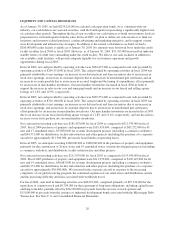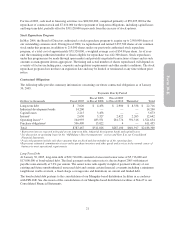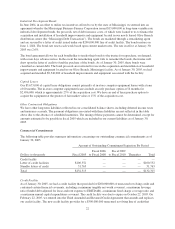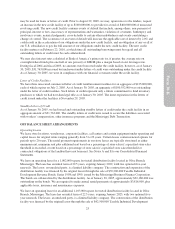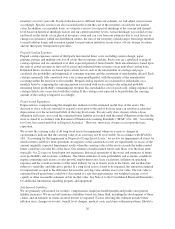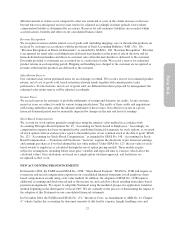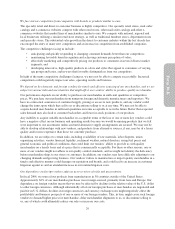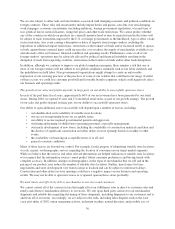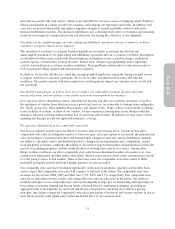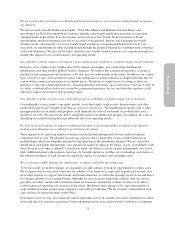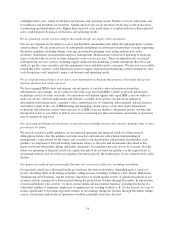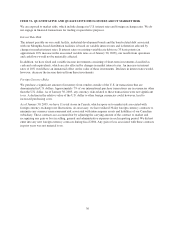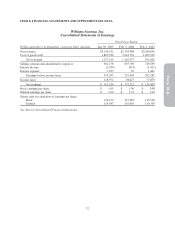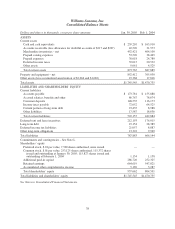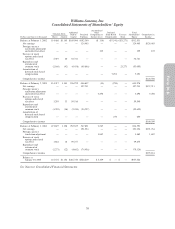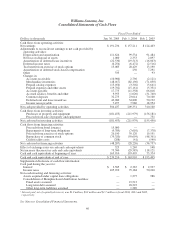Pottery Barn 2004 Annual Report Download - page 37
Download and view the complete annual report
Please find page 37 of the 2004 Pottery Barn annual report below. You can navigate through the pages in the report by either clicking on the pages listed below, or by using the keyword search tool below to find specific information within the annual report.We are also subject to other risks and uncertainties associated with changing economic and political conditions in
foreign countries. These risks and uncertainties include import duties and quotas, concerns over anti-dumping,
work stoppages, economic uncertainties (including inflation), foreign government regulations, war and fears of
war, political unrest, natural disasters, rising fuel prices and other trade restrictions. We cannot predict whether
any of the countries in which our products are currently manufactured or may be manufactured in the future will
be subject to trade restrictions imposed by the U.S. or foreign governments or the likelihood, type or effect of any
such restrictions. Any event causing a disruption or delay of imports from foreign vendors, including the
imposition of additional import restrictions, restrictions on the transfer of funds and/or increased tariffs or quotas,
or both, against home-centered items could increase the cost or reduce the supply of merchandise available to us
and adversely affect our business, financial condition and operating results. Furthermore, some or all of our
foreign vendors’ operations may be adversely affected by political and financial instability resulting in the
disruption of trade from exporting countries, restrictions on the transfer of funds and/or other trade disruptions.
In addition, although we continue to improve our global compliance program, there remains a risk that one or
more of our foreign vendors will not adhere to our global compliance standards such as fair labor standards and
the prohibition on child labor. Non-governmental organizations might attempt to create an unfavorable
impression of our sourcing practices or the practices of some of our vendors that could harm our image. If either
of these occurs, we could lose customer goodwill and favorable brand recognition, which could negatively affect
our business and operating results.
The growth of our sales and profits depends, in large part, on our ability to successfully open new stores.
In each of the past three fiscal years, approximately 60% of our net revenues have been generated by our retail
stores. During 2004, we opened 43 new and 17 remodeled retail stores as part of our growth strategy. The growth
of our sales and profits depend, in large part, on our ability to successfully open new stores.
Our ability to open additional stores successfully will depend upon a number of factors, including:
• our identification and availability of suitable store locations;
• our success in negotiating leases on acceptable terms;
• our ability to secure required governmental permits and approvals;
• our hiring and training of skilled store operating personnel, especially management;
• our timely development of new stores, including the availability of construction materials and labor and
the absence of significant construction and other delays in store openings based on weather or other
events;
• the availability of financing on acceptable terms, if at all; and
• general economic conditions.
Many of these factors are beyond our control. For example, for the purpose of identifying suitable store locations,
we rely, in part, on demographic surveys regarding the location of consumers in our target market segments.
While we believe that the surveys and other relevant information are helpful indicators of suitable store locations,
we recognize that the information sources cannot predict future consumer preferences and buying trends with
complete accuracy. In addition, changes in demographics, in the types of merchandise that we sell and in the
pricing of our products may reduce the number of suitable store locations. Further, time frames for lease
negotiations and store development vary from location to location and can be subject to unforeseen delays.
Construction and other delays in store openings could have a negative impact on our business and operating
results. We may not be able to open new stores or, if opened, operate those stores profitably.
We must timely and effectively deliver merchandise to our stores and customers.
We cannot control all of the various factors that might affect our fulfillment rates in direct-to-customer sales and
timely and effective merchandise delivery to our stores. We rely upon third party carriers for our merchandise
shipments and reliable data regarding the timing of those shipments, including shipments to our customers and to
and from all of our stores. Accordingly, we are subject to the risks, including labor disputes such as the west
coast port strike of 2002, union organizing activity, inclement weather, natural disasters, and possible acts of
30


